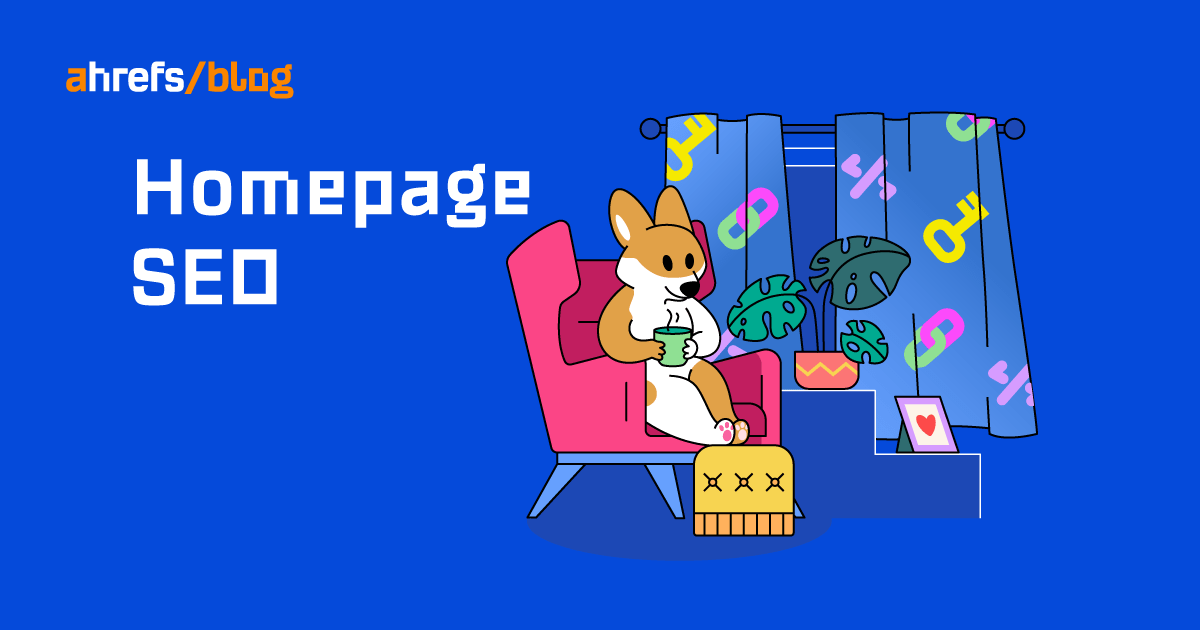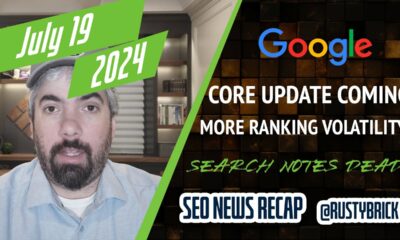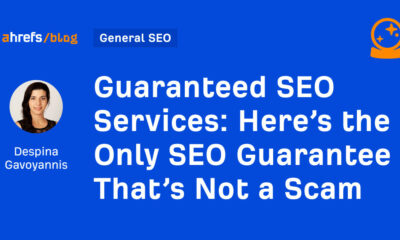SEO
Yes, It Exists & Here’s How to Do It

Let’s get something straight—homepage SEO exists.
A homepage can rank for relevant non-branded keywords and help other pages on your site to rank too. You can find proof of that all over the web. Here’s one from Squarespace’s homepage:

But SEO is not the only or primary aspect of a homepage. So in this article, you’ll learn how to optimize your homepage for search engines in four steps without undermining your homepage’s primary purpose.
How to optimize a homepage for search engines – four steps
Homepage SEO resembles the general flow of optimizing a page for search engines. We have keyword research, creating SEO content, and building links. However, there are some caveats and special considerations. Let’s dig in.
1. Choose the target keyword
Your homepage should clearly “tell” Google and your readers what your product/service is about. Both parties need to understand the context.
In SEO, this is done mainly by focusing the content of a page on a target keyword. This keyword defines what the page is about. This doesn’t mean that your page will only rank for this keyword alone. It will most certainly rank for tens and even hundreds of related keywords. But first, you need to choose that one.
Start by making a list of keywords that best define your product or service. For the sake of our example, let’s assume you’re competing with Intercom in the space of communication tools. Here’s how you can populate your list:
- Brainstorm – You can do this on your own or in a group. Just create a list of words or phrases that come to your mind. Since you probably already know a great deal about your niche, these words should come quite naturally.
- Analyze competitors – Make a list of your competitors and read through their websites to find words that they use to describe their offerings.
So let’s say we came up with the following keywords: CRM, communications platform, customer communications platform, customer communications tool, conversational marketing platform, conversational marketing tool, customer messaging tool, conversational relationship platform, and customer service software.
Next, we’ll plug those keywords into an SEO tool. We will need to get the traffic potential of each keyword and understand the search intent behind all of them. You can use any SEO tool you like, but it’s best if you use a tool that doesn’t group keywords.
If we use Ahrefs’ Keywords Explorer, here’s what we will see:

To get a clearer picture of our Traffic Potential here, I’ve ordered our keywords based on this metric (TP).
Ahrefs shows data for 6 out of 9 keywords. The remaining three are most likely very low search volume keywords. Because of their low popularity, we won’t bother with them in this article.
Next, we need to analyze the search intent for these keywords.
Search intent stands for the reason behind the search query. Basically, we want to see in the search engine results pages (SERPs) for these keywords the same kind of pages that you want to optimize: homepages.
Additionally, since we can assume our homepage will be describing a product, we can expand our search for landing pages with the same intent. If you want to dive deeper and understand the reasoning behind that, see our guide on search intent.
Moving on. Look at the top 10 pages ranking for those keywords and see if you can spot a homepage or a product page (if your competitors are offering a suite of various tools). In Ahrefs, you can just click on the SERP icon.

Below are two instances where we can see such pages for the keywords “CRM” and “customer communications platform.”

Here, we can see two product pages dedicated to CRMs—both by companies delivering entire product suites.

For the keyword “customer communications platform,” we can see Intercom’s homepage and product pages from Freshdesk and MHC.
At this stage, you may find yourself in one of these scenarios:
- You’ve found just one matching keyword – You can use that keyword as a target keyword.
- You’ve found multiple matching keywords – You still need to choose one primary keyword. You can look at the GV column (Global Volume) to gauge the popularity of the keyword (i.e., the language your target audience uses the most).
- You’ve found none – In this case, you should stick to the keyword that best describes your offering. There are two reasons for that: First, your homepage likely serves more purposes than SEO; second, search intent for that keyword may change direction and start showing particular businesses (like yours).
What to do with other relevant keywords from this stage? Keep them. You may still need to use them in the copy of your homepage to show its context. Other than that, you may want to use them for other content formats (blog posts, landing pages, free tools, etc.).
2. Create content for your homepage
In this section, we’ll cover crafting the title tag, meta description, main content of your homepage, and addition of schema markup.
Title
The title is one of the things Google will take into account when understanding and ranking your homepage. (Yes, it is a tiny ranking factor.)
That said, the title is not only meant for Google. You still need to make the title attractive enough to make people click.
Here are some good practices for crafting your homepage’s title:
- Make it eye-catching and accurate – Write a line that piques users’ interest and accurately describes what’s unique about your offer.
- Insert the target keyword in your title – But remember to make it sound natural.
- Insert your brand name – How and where you put it won’t impact rankings (but may impact the user’s choice).
- Fit within 60 characters – Otherwise, your description may get truncated, and you’ll increase the chances of Google rewriting your title.
Once you rank in the top 10 for that keyword, it’s the perfect time to start optimizing your title for the click-through rate.
Recommended reading: How to Craft the Perfect SEO Title Tag (Our 4‑Step Process)
Meta description
Unlike the title tag, the meta description is not a ranking factor.
Interestingly enough, Google is known for rewriting meta description tags. (According to our study, this happens 62.78% of the time.)
At any rate, a good meta description can interest the searcher enough to enter your homepage. So:
- Make it compelling enough to make the user click.
- Refrain from any “clickbaity” practices. If your page doesn’t pass the “sniff test,” the user will simply return to the SERPs and will avoid your page in the future. Or simply, they won’t click in the first place.
- Don’t make your description longer than 920 px. Use a tool like SERPSim to make sure your description will fit.
- It’s a good idea to treat the title and description as two parts of the same message. The description can be an extension of or support what you claim in the title.


Recommended reading: How to Write the Perfect Meta Description
Main content
First and foremost, think about your brand and your business when creating the main content of the homepage. What do your visitors need to know about your business right off the bat? What makes you unique? What path should the user take on your website? SEO should come second in those considerations.
When it comes to SEO, you need to remember two things when designing your main content:
- Matching search intent
- Inserting (naturally) your target keyword into the H1 tag
For the first point (matching search intent), you need to look at the top pages on the SERP for a given keyword and analyze what these pages are talking about and what they offer.
For example, for the keyword “CRM,” a lot of pages offer basic information on CRMs: what is a CRM, benefits, how does a CRM work, features of a CRM, etc.

This is an indication that Google “promotes” pages that offer some kind of education on the topic of CRMs. So it’s probably a good idea to include similar points inside your main content so that Google can “see” your page as something that helps searchers understand the product and learn how they can benefit from it.
You can go a level deeper in picking related terms with the help of Ahrefs’ Also rank for and Also talk about reports. Just plug in a keyword into Ahrefs’ Keywords Explorer and use the said reports to find out:
- Which keywords the top 10 ranking pages for your target keyword also rank for.
- Which other keywords and phrases the top-ranking pages for your target keyword frequently mention.

Some of the results of the Also talk about report for the keyword “CRM.”
Lastly, however obvious this may sound, you don’t want to forget to mention your brand in the copy. This is still part of search intent, as a lot of searchers will likely land on your homepage through branded keywords.
As for the second point (inserting your target keyword into the H1 tag), it’s another situation when SEO comes last. Inserting the primary keyword into this tag will help Google understand the context. But the H1 tag is also about improving the user experience and accessibility of a page.
On top of that, there’s nothing wrong with making your H1 copy more persuasive than the competition.

Recommended reading: On-Page SEO: The Beginner’s Guide
Add schema markup
Schema markup is code that helps search engines to understand your content and better represent it in the search results.
Adding schema markup can help you gain more visibility on the SERPs by displaying rich snippets which, in turn, can lead to more traffic.
In practice, adding schema markup to a homepage is comparable to filling out meta tags. You’re filling out some predefined categories with information about your organization, your product, etc.
You can write schema “by hand,” but it’s probably best to generate it using tools like Schema Builder extension.
Here’s an example schema markup from Intercom’s homepage. Here, it’s using the “organization” type with two properties (URL and logo):

And below, we have an interesting case of multiple schema markup types found on ZOHO’s CRM product page:

And thanks to having this information inside the schema…
"aggregateRating": {
"@type": "AggregateRating",
"ratingValue": "4.3",
"reviewCount": "5148"
}
… Google can display the review snippet:

Another interesting example is how HubSpot uses schema markup to show FAQs fitting the informational character of the search intent for the keyword “CRM”:


The type of schema property that you may want to include on your homepage is the organization. It will help Google understand that your page is about an organization (and not, for example, a type of fruit). This markup can also help you earn a knowledge panel.
Another often-used feature is the sitelinks search box. Google can display this feature whether you like it or not (based on the utility for the user), but you can have some control of it using schema.

It’s worth experimenting with other types of properties too: reviews, FAQ, local business, etc. Having multiple schemas on your homepage is OK, as long as you match that with actual content on your homepage and don’t provide conflicting information.
Recommended reading: What Is Schema Markup? How to Use It for SEO
3. Build high-quality external links
A homepage, just like any other page, needs backlinks to effectively compete for non-branded keywords in search engines. The more good quality backlinks you have, the higher the chances of ranking in the top 10.

The competition for this keyword is really tough…
There are multiple sources where you can get backlinks for your homepage. But not all of them will pass the same link authority. So before you go chasing those links, keep in mind what makes a good (high-quality) backlink:
- Relevance – You should aim to get backlinks from websites related to your niche.
- Authority – Backlinks from strong webpages usually transfer more “authority” than those from weak ones. In addition, links from pages with fewer outbound links will pass more authority.
- Traffic – There’s a small but clear correlation between rankings and backlinks from pages with organic search traffic (source).
- Placement – Prominently placed links may pass more authority than others. The general rule of thumb is that the more likely the user is to click a link, the more PageRank the link will pass. So for example, links within the main copy of the text placed high on the page will pass more authority than links inside the footer placed among many other links.
- Anchor – Google reads the surrounding content of a link as a signal for the context of the page. However, according to our study, the correlation between anchor text and search rankings is weak.
- Followed vs. nofollowed – Nofollowed backlinks usually don’t influence the linked page’s rankings.
Keep in mind, though, that high-quality links are hard to get. More often than not, you will really need to build a strong case to get a site to mention your brand, product, etc.
With that out of the way, let’s take a look at some places where you can get quality backlinks to your homepage.
Reviews
Positive reviews can greatly increase demand for your product or service. But if your reviews can also get you a high-quality backlink, those reviews can help you rank higher on the SERPs and generate additional traffic.
To look for review opportunities, you can analyze your competitors’ backlinks and reach out to the same websites.

You can look for review opportunities by filtering competitors’ backlinks with words often used in reviews. Examples: best, compare, comparison, alternative, etc.
Another way to source those opportunities is to use Google to find out who writes reviews in your product category. But if you want to do it more efficiently, you can use Ahrefs’ Content Explorer to find these sites and easily filter them based on page traffic, domain authority, etc.

Digital PR
Digital PR is a great opportunity for building links because links from the media will usually be some of the most authoritative backlinks you can get.
Typically there are two ways to do this. You can:
- Answer journalist requests on sites like HARO, ProfNet, or SourceBottle. You can also scan Twitter for hashtags like #journorequest.
- Write and pitch press releases to reputable and relevant media outlets.
If you can provide unique insight on a problem related to your niche or if you’re doing something newsworthy, there is a chance a journalist will use you as a source for their story. As a result, your brand will get exposure and your homepage will get a link.

Just like reviews, PR can happen “organically” without your input. Will those stories link to you as well? You can find out by looking for unlinked mentions and then trying to turn them into links. We have a full guide on tackling unlinked brand mentions here.
Guest posts
Guest posting is quite a popular phenomenon on the internet. It probably doesn’t need any kind of introduction.
Like reviews, guest posts can benefit a brand and its product or service in many ways: brand awareness, product demand, etc. This tactic is worth pursuing just for the sake of those benefits.
But when SEOs talk about guest posts or guest blogging, there is only one goal on the table: getting a high-quality backlink. One is all you need.
You can look for guest blogging opportunities manually using Google:

Or you can do it at scale with an SEO tool that lets you quickly filter through the results. Here’s a video showing the process using Ahrefs’ Content Explorer.
https://www.youtube.com/watch?v=aQK1Vbgb-RY
Other tactics
Link building is a broad topic with many tactics and techniques. Some of the other ideas for getting backlinks are:
- Getting featured in directories and listings, which is especially effective with homepages for local businesses.
- Studying your competitors’ backlinks to replicate their links (e.g., from review sites) and spot patterns in the types of backlinks.
- Reclaiming lost links.
- Adding links to community sites.
We cover those and more in our resources on the topic:
4. Add internal links
From an SEO perspective, three things happen when you link internally:
- You help new pages get discovered by search engines – Internal links provide a crawl path to target pages.
- You pass link authority between your pages – This way, you can boost other pages you own.
- You help search engines understand what a page is about – You need Google to understand the meaning of your content if you want to rank for relevant keywords.
Because of the reasons above, you should seek opportunities to link both from your homepage and to your homepage.
Add links from your homepage (to your most important content)
Homepages are usually pages with the highest number of backlinks. They amass link authority that can be passed to other pages to help them rank.
Here’s how Salesforce uses this technique to boost its page explaining what CRM is:

And it seems to work. That page ranks #1 for the keyword “CRM”:

Another popular way to link to your important content is through the footer of the page. However, based on our knowledge of how links pass authority, this technique will pass less authority compared to Salesforce’s technique.

Intercom links from the homepage to selected blog posts through the footer of the page.
Add links to your homepage
If your resource pages (blog, ebooks, case studies, etc.) link to your homepage through site navigation or even through a logo, those links already pass page authority to your homepage.
However, if you remember from our section about what makes a link high-quality, the placement of the link and its anchor matter as well. The links that a user is more likely to click are likely to pass more authority. And the anchor used in that link helps Google grasp the context of your homepage.
For these reasons, you should also link to your homepage within the main content where it is relevant. So for example, instead of just mentioning your brand or product inside a blog post, include a link to it as well (one per article is probably enough).

Links from HubSpot’s blog pointing to its homepage are quite common.
FAQ
Here, we’ll answer some frequently asked questions about optimizing a homepage for search engines.
Is the homepage most important for SEO?
Your homepage will likely have the most backlinks and will be the landing page for most branded keywords. However, this doesn’t mean that your SEO efforts should be limited to this page only or that you should be prioritizing this page at all times.
How long does it take Google to display changes on your homepage?
Google states that crawling can take anywhere from a few days to a few weeks. Make sure your page is crawlable and indexable to Google in the first place.
How much text should there be on a homepage?
There is no definitive answer for this from an SEO perspective. Focus on matching search intent instead and making your copy appealing to the reader.
Final thoughts
Homepages tend to be neglected in SEO strategies. They shouldn’t be. As you can see, they can rank for important keywords and help other pages rank at the same time.
That said, you shouldn’t try to rank a homepage for a given keyword at all costs. There are some scenarios where it’s probably better to target keywords with blog posts or dedicated landing pages. This is true when:
- The content of your homepage won’t be able to match search intent. This shouldn’t dissuade you from using other words or phrases that, in your opinion, best describe your business.
- Your offering is so complex that trying to make it all about one topic will hurt your business. See how Twilio’s site architecture matches the complexity of its business. Expecting its homepage to rank for one non-branded keyword just doesn’t make sense.
One thing we need to make clear here is that a homepage is just a page. From an SEO perspective, the same rules apply. And in this game, search intent is still king.
For example, when you Google “speed test,” you expect to see a free tool for testing internet connection. And this is what the top-ranking websites provide on their homepages right off the bat.
It doesn’t matter what “tricks” you use to rank here; if you don’t provide a tool for that, then game over.
And you can’t wish for a better confirmation of search intent than this:

Got questions or comments? Ping me on Twitter.
SEO
Google Cautions On Blocking GoogleOther Bot

Google’s Gary Illyes answered a question about the non-search features that the GoogleOther crawler supports, then added a caution about the consequences of blocking GoogleOther.
What Is GoogleOther?
GoogleOther is a generic crawler created by Google for the various purposes that fall outside of those of bots that specialize for Search, Ads, Video, Images, News, Desktop and Mobile. It can be used by internal teams at Google for research and development in relation to various products.
The official description of GoogleOther is:
“GoogleOther is the generic crawler that may be used by various product teams for fetching publicly accessible content from sites. For example, it may be used for one-off crawls for internal research and development.”
Something that may be surprising is that there are actually three kinds of GoogleOther crawlers.
Three Kinds Of GoogleOther Crawlers
- GoogleOther
Generic crawler for public URLs - GoogleOther-Image
Optimized to crawl public image URLs - GoogleOther-Video
Optimized to crawl public video URLs
All three GoogleOther crawlers can be used for research and development purposes. That’s just one purpose that Google publicly acknowledges that all three versions of GoogleOther could be used for.
What Non-Search Features Does GoogleOther Support?
Google doesn’t say what specific non-search features GoogleOther supports, probably because it doesn’t really “support” a specific feature. It exists for research and development crawling which could be in support of a new product or an improvement in a current product, it’s a highly open and generic purpose.
This is the question asked that Gary narrated:
“What non-search features does GoogleOther crawling support?”
Gary Illyes answered:
“This is a very topical question, and I think it is a very good question. Besides what’s in the public I don’t have more to share.
GoogleOther is the generic crawler that may be used by various product teams for fetching publicly accessible content from sites. For example, it may be used for one-off crawls for internal research and development.
Historically Googlebot was used for this, but that kind of makes things murky and less transparent, so we launched GoogleOther so you have better controls over what your site is crawled for.
That said GoogleOther is not tied to a single product, so opting out of GoogleOther crawling might affect a wide range of things across the Google universe; alas, not Search, search is only Googlebot.”
It Might Affect A Wide Range Of Things
Gary is clear that blocking GoogleOther wouldn’t have an affect on Google Search because Googlebot is the crawler used for indexing content. So if blocking any of the three versions of GoogleOther is something a site owner wants to do, then it should be okay to do that without a negative effect on search rankings.
But Gary also cautioned about the outcome that blocking GoogleOther, saying that it would have an effect on other products and services across Google. He didn’t state which other products it could affect nor did he elaborate on the pros or cons of blocking GoogleOther.
Pros And Cons Of Blocking GoogleOther
Whether or not to block GoogleOther doesn’t necessarily have a straightforward answer. There are several considerations to whether doing that makes sense.
Pros
Inclusion in research for a future Google product that’s related to search (maps, shopping, images, a new feature in search) could be useful. It might be helpful to have a site included in that kind of research because it might be used for testing something good for a site and be one of the few sites chosen to test a feature that could increase earnings for a site.
Another consideration is that blocking GoogleOther to save on server resources is not necessarily a valid reason because GoogleOther doesn’t seem to crawl so often that it makes a noticeable impact.
If blocking Google from using site content for AI is a concern then blocking GoogleOther will have no impact on that at all. GoogleOther has nothing to do with crawling for Google Gemini apps or Vertex AI, including any future products that will be used for training associated language models. The bot for that specific use case is Google-Extended.
Cons
On the other hand it might not be helpful to allow GoogleOther if it’s being used to test something related to fighting spam and there’s something the site has to hide.
It’s possible that a site owner might not want to participate if GoogleOther comes crawling for market research or for training machine learning models (for internal purposes) that are unrelated to public-facing products like Gemini and Vertex.
Allowing GoogleOther to crawl a site for unknown purposes is like giving Google a blank check to use your site data in any way they see fit outside of training public-facing LLMs or purposes related to named bots like GoogleBot.
Takeaway
Should you block GoogleOther? It’s a coin toss. There are possible potential benefits but in general there isn’t enough information to make an informed decision.
Listen to the Google SEO Office Hours podcast at the 1:30 minute mark:
Featured Image by Shutterstock/Cast Of Thousands
SEO
AI Search Boosts User Satisfaction

A new study finds that despite concerns about AI in online services, users are more satisfied with search engines and social media platforms than before.
The American Customer Satisfaction Index (ACSI) conducted its annual survey of search and social media users, finding that satisfaction has either held steady or improved.
This comes at a time when major tech companies are heavily investing in AI to enhance their services.
Search Engine Satisfaction Holds Strong
Google, Bing, and other search engines have rapidly integrated AI features into their platforms over the past year. While critics have raised concerns about potential negative impacts, the ACSI study suggests users are responding positively.
Google maintains its position as the most satisfying search engine with an ACSI score of 81, up 1% from last year. Users particularly appreciate its AI-powered features.
Interestingly, Bing and Yahoo! have seen notable improvements in user satisfaction, notching 3% gains to reach scores of 77 and 76, respectively. These are their highest ACSI scores in over a decade, likely due to their AI enhancements launched in 2023.
The study hints at the potential of new AI-enabled search functionality to drive further improvements in the customer experience. Bing has seen its market share improve by small but notable margins, rising from 6.35% in the first quarter of 2023 to 7.87% in Q1 2024.
Customer Experience Improvements
The ACSI study shows improvements across nearly all benchmarks of the customer experience for search engines. Notable areas of improvement include:
- Ease of navigation
- Ease of using the site on different devices
- Loading speed performance and reliability
- Variety of services and information
- Freshness of content
These improvements suggest that AI enhancements positively impact various aspects of the search experience.
Social Media Sees Modest Gains
For the third year in a row, user satisfaction with social media platforms is on the rise, increasing 1% to an ACSI score of 74.
TikTok has emerged as the new industry leader among major sites, edging past YouTube with a score of 78. This underscores the platform’s effective use of AI-driven content recommendations.
Meta’s Facebook and Instagram have also seen significant improvements in user satisfaction, showing 3-point gains. While Facebook remains near the bottom of the industry at 69, Instagram’s score of 76 puts it within striking distance of the leaders.
Challenges Remain
Despite improvements, the study highlights ongoing privacy and advertising challenges for search engines and social media platforms. Privacy ratings for search engines remain relatively low but steady at 79, while social media platforms score even lower at 73.
Advertising experiences emerge as a key differentiator between higher- and lower-satisfaction brands, particularly in social media. New ACSI benchmarks reveal user concerns about advertising content’s trustworthiness and personal relevance.
Why This Matters For SEO Professionals
This study provides an independent perspective on how users are responding to the AI push in online services. For SEO professionals, these findings suggest that:
- AI-enhanced search features resonate with users, potentially changing search behavior and expectations.
- The improving satisfaction with alternative search engines like Bing may lead to a more diverse search landscape.
- The continued importance of factors like content freshness and site performance in user satisfaction aligns with long-standing SEO best practices.
As AI becomes more integrated into our online experiences, SEO strategies may need to adapt to changing user preferences.
Featured Image: kate3155/Shutterstock
SEO
Google To Upgrade All Retailers To New Merchant Center By September

Google has announced plans to transition all retailers to its updated Merchant Center platform by September.
This move will affect e-commerce businesses globally and comes ahead of the holiday shopping season.
The Merchant Center is a tool for online retailers to manage how their products appear across Google’s shopping services.
Key Changes & Features
The new Merchant Center includes several significant updates.
Product Studio
An AI-powered tool for content creation. Google reports that 80% of current users view it as improving efficiency.
This feature allows retailers to generate tailored product assets, animate still images, and modify existing product images to match brand aesthetics.
It also simplifies tasks like background removal and image resolution enhancement.
Centralized Analytics
A new tab consolidating various business insights, including pricing data and competitive analysis tools.
Retailers can access pricing recommendations, competitive visibility reports, and retail-specific search trends, enabling them to make data-driven decisions and capitalize on popular product categories.
Redesigned Navigation
Google claims the new interface is more intuitive and cites increased setup success rates for new merchants.
The platform now offers simplified website verification processes and can pre-populate product information during setup.
Initial User Response
According to Google, early adopters have shown increased engagement with the platform.
The company reports a 25% increase in omnichannel merchants adding product offers in the new system. However, these figures have yet to be independently verified.
Jeff Harrell, Google’s Senior Director of Merchant Shopping, states in an announcement:
“We’ve seen a significant increase in retention and engagement among existing online merchants who have moved to the new Merchant Center.”
Potential Challenges and Support
While Google emphasizes the upgrade’s benefits, some retailers, particularly those comfortable with the current version, may face challenges adapting to the new system.
The upgrade’s mandatory nature could raise concerns among users who prefer the existing interface or have integrated workflows based on the current system.
To address these concerns, Google has stated that it will provide resources and support to help with the transition. This includes tutorial videos, detailed documentation, and access to customer support teams for troubleshooting.
Industry Context
This update comes as e-commerce platforms evolve, with major players like Amazon and Shopify enhancing their seller tools. Google’s move is part of broader efforts to maintain competitiveness in the e-commerce services sector.
The upgrade could impact consumers by improving product listings and providing more accurate information across Google’s shopping services.
For the e-commerce industry as a whole, it signals a continued push towards AI-driven tools and data-centric decision-making.
Transition Timeline
Google states that retailers will be automatically upgraded by September if they still need to transition.
The company advises users to familiarize themselves with the new features before the busy holiday shopping period.
Featured Image: BestForBest/Shutterstock
-

 SEARCHENGINES5 days ago
SEARCHENGINES5 days agoBillions Of Google goo.gl URLs To 404 In The Future
-
SEARCHENGINES4 days ago
Daily Search Forum Recap: July 22, 2024
-

 SEARCHENGINES7 days ago
SEARCHENGINES7 days agoGoogle Core Update Coming, Ranking Volatility, Bye Search Notes, AI Overviews, Ads & More
-

 SEO5 days ago
SEO5 days ago11 Copyscape Alternatives To Check Plagiarism
-

 SEO6 days ago
SEO6 days agoGoogle Warns Of Last Chance To Export Notes Search Data
-
SEARCHENGINES3 days ago
Daily Search Forum Recap: July 23, 2024
-

 AFFILIATE MARKETING6 days ago
AFFILIATE MARKETING6 days agoThe Top 5 AI Tools That Can Revolutionize Your Workflow and Boost Productivity
-

 SEO4 days ago
SEO4 days agoSystem Builders – How AI Changes The Work Of SEO
















You must be logged in to post a comment Login